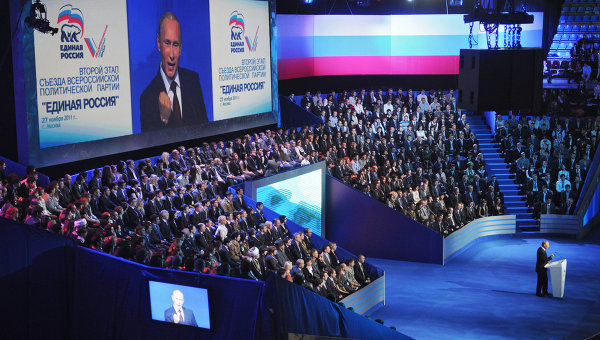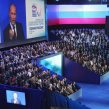
Russia Faces Elections That Will Decide Nothing
Publication: Eurasia Daily Monitor Volume: 8 Issue: 215
By:

In the last week before the State Duma elections, the only real question is how low the support for the dominant United Russia party has actually fallen. Opinion polls four years ago showed that it would gather 68 percent to 66 percent of the vote, now similar polls indicate that only 53 percent of those who are going to participate in the voting are ready to support this union of the ruling bureaucracy (www.levada.ru, Moskovskiy Novosti, November 25). This will suffice to gain a safe majority of seats in the constitutionally weak and deservedly unpopular parliament, so until a few weeks ago Russia’s rulers had seen no reason to worry about the outcome of the safely controlled electoral process. There was hardly any effort at mobilizing public enthusiasm; the United Russia party did not bother to present some fresh promises in a coherent program; and the administrative methods were used with very little pretense about playing by the rules (Nezavisimaya Gazeta, November 24). It was only in the final stretch of the campaign that the Kremlin discovered a need to energize the support base, and Prime Minister Vladimir Putin instructed the leadership of the sincerely servile party to gain enough votes to ensure that the parliament would not be fragmented (Vedomosti, November 25).
The turning point where the generally indifferent public attitude has become disgruntled was President Dmitry Medvedev’s announcement that he would not seek a second term, which Putin expected to be applauded as the end of embarrassing uncertainty. His loyalists indeed went through the motions of hailing the return of the master of Russian politics to the position of supreme authority, but their fake jubilation only illuminated the wear and tear of Putin’s political “brand” (Vedomosti, November 9). For many in the business elites and the nascent middle class who saw a rational point in Medvedev’s “modernization” discourse, shallow as it was, the renewed emphasis on stabilization came as a deep disappointment (www.gazeta.ru, November 16). For many more, the blatant disregard of their right to have a choice became an offense generating resentment at being taken for granted in the lackluster campaign.
Putin’s inflated confidence in his unique connection with the “masses” was punctured by the whistles that spoiled his PR-moment at a boxing match, which were duly erased in the TV reporting but amplified in the blogosphere, so that he had to cancel several public appearances (BestToday, November 22). A swing in public mood had to be orchestrated before the United Russia forum on November 27, where Putin was formally nominated as the presidential candidate (Moskovsky Komsomolets, November 25). One way of creating a boost in approval ratings was seen in racing to implement Putin’s vision of a Eurasian union, so a new treaty with Kazakhstan and Belarus was signed and a generous gas deal with the latter was sealed (Kommersant, November 26). The public attitude, however, remains indifferent as the memories about unseemly quarrels with Belarus are quite fresh and the proposition about rescuing deeply troubled Kyrgyzstan and Tajikistan is manifestly unpopular.
Another certified method of mobilizing public support is taking a tough stance against the perfidious West, and Medvedev appeared on TV with a somber address to the citizens of Russia “in connection with the situation concerning the NATO countries’ missile defense system in Europe.” The gravity of the tone compensated for the fact that nothing particular was happening with that “situation,” which has been shaped by the deadlock in discussions on the rationale for and technicalities of intercepting ballistic missiles that emerged in the early stages of negotiating the new START. The disagreement runs deep, but it is a matter of political choice whether to play it up or to look for ways of isolating it and prioritizing cooperative initiatives (www.gazeta.ru, November 24).
The “counter-measures” that Medvedev resolutely announced are not particularly impressive and pertain primarily to the development of Russia’s own strategic defense, organized with a new command (Nezavisimaya Gazeta, November 25). The technical means necessary for deploying a meaningful air defense, not to mention space, are woefully inadequate, and the antiquated grouping of nuclear anti-missiles around Moscow needs urgent dismantling. As for moving tactical Iskander missiles to the Kaliningrad exclave, this threat has already been announced more than once, and it is hardly going to add popularity to United Russia, which is scoring very low in the Kaliningrad oblast (Moskovsky Komsomolets, November 26).
The plain strategic fact is that Russia cannot afford a confrontation with the US and NATO, and is the main beneficiary of the existing arms control regime, which grants it a symbolic parity with the US, so demonstrations of toughness ring hollow (Ezhednevny Zhurnal, November 25). Putin’s political class is so deeply involved with the West through money flows that the quarrels between “oligarchs” are now settled in London more often than in the Kremlin. Massive evacuation of wealth from Russia continues non-stop by multiple channels from Cyprus to Latvia, and the last thing the happy owners of real estate in Slanchev Bryag or Cote d’Azur need is a deliberate provocation of an unnecessary crisis over an issue that is non-existent in their mercantilist worldview. Even those who have a grasp on security policy and understand that NATO is hurt by debacles in Afghanistan and Pakistan and weakened by austerity measures are upset by the harsh demarche, because the one thing that could help NATO in regaining unity is the Russian threat (Moskovskiy Novosti, November 25).
Medvedev’s strategic bluff has turned out to be even less politically useful than Putin’s appeal to Soviet nostalgia, only adding to the erosion of credibility of the leadership that is so short on ideas to justify its monopoly on power. The pompous show staged by United Russia on November 27, merely confirmed that the ruling bureaucracy is firmly set against any changes and has already falsified the elections turning them into a manufacturing of the proof that Russia has no alternative to stagnation under Putin’s ever-lasting watch. This mockery of democracy is so shameless that it could make a difference for the majority of Russians who are not prepared to give up on their country.




